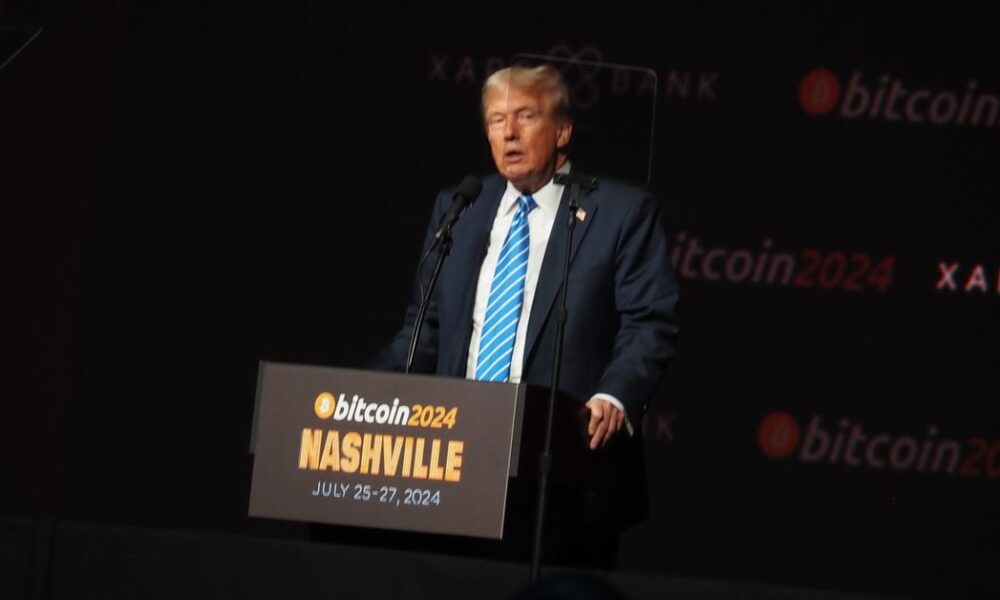Blockchain
“Every one of you will be gone”

NASHVILLE — Former U.S. President Donald Trump vowed to maintain a “strategic national reserve of bitcoin” and “never sell” government-seized bitcoin in a lighthearted speech that strengthened the Republican nominee’s grip on blocking cryptocurrency voting and fundraising.
Before the event, there had been speculation and hope among cryptocurrency enthusiasts that Trump would announce such a reserve.
Speaking to a packed house of more than 3,000 attendees at the Bitcoin Conference in Nashville on Saturday, Trump said of bitcoin: “I want it mined, minted and produced in the United States.” He went on to outline a “comprehensive” cryptocurrency policy that ranges from regulating stablecoins to the right to self-custody your bitcoin.
The speech sealed bitcoin’s steady march from the Internet’s furthest reaches to the heart of American politics, once the favored and maligned currency of darknet markets.
“If we don’t do it, China will,” he said of digital asset adoption. Cryptocurrencies are “the steel industry of 100 years ago, you’re just in your infancy,” he said. “It will probably surpass gold one day… There’s never been anything like it.”
He added that if Democrats retain the White House, it would be a disaster for cryptocurrencies. “If they win this election, all of you are out. They’re going to be vicious. They’re going to be ruthless. They’re going to do things you wouldn’t believe.”
If elected, Trump said his first-day plans included firing Gary Gensler, the influential Securities and Exchange Commission chairman who is widely despised in the cryptocurrency industry. The pledge received a huge round of applause from the crowd. “I didn’t know that was That unpopular,” Trump said. Trump also said he would appoint a “bitcoin and cryptocurrency advisory council” once he takes office.
Trump arrived at Nashville’s Music City Center after a major campaign fundraiser that targeted deep-pocketed cryptocurrency executives and raised tens of millions of dollars, according to sources. Thousands of bitcoiners camped out for hours to see the former president, a recent convert to cryptocurrency after previously criticizing digital assets. He is now the first president to appear at a bitcoin event.
In the opening moments, he thanked the event organizers and said there were many legends in the room. Trump named several cryptocurrency figures, including Tyler and Cameron Winklevoss, the founders of the Gemini crypto exchange, and Michael Saylor of MicroStrategy.
Cryptocurrencies entered the 2024 election agenda in late May, when Trump declared himself the industry’s candidate and said, “If you’re in favor of cryptocurrency, you’re going to vote for Trump because they want to end it.”
His embrace has spurred a partisan realignment within the crypto industry’s upper echelons. Suddenly, well-connected voters—hedge fund lawyers, startup founders, and financiers—who had previously voted Democrat were murmuring about backing Trump as a salve for years of perceived bullying by President Joe Biden’s regulatory state.
They were joined at the three-day conference by crowds of Trump fanatics who flocked to Nashville wearing hats of every color that read “Make Bitcoin Great Again.” For many of the 20,000 attendees, supporting Trump seemed like a foregone conclusion. And lo and behold, he now supported Bitcoin.
Behind the scenes in Nashville, industry leaders rewarded Trump’s linchpin with mountains of cash to fuel his campaign; a fundraiser just before his speech asked for nearly $900,000 per ticket. Other candidates further down the ticket in Nashville held their own fundraisers.
Cryptocurrency advocates widely see the 2024 election as their best chance to reshape hostile U.S. regulations; many see Trump as the best candidate to do so. This despite his previous stance during his presidency that bitcoin was “based on nothing.”
Always a marketer, after leaving the White House, Trump released sold-out NFT collections of himself in various states of patriotism. Their millions of dollars in sales gave the entrepreneur a different perspective on the industry he had once rejected.
Before Biden dropped out of the race, his campaign had made no effort to court cryptocurrency fans or Bitcoiners, at one point calling buyers of Trump’s NFTs “pussies.” After years of alleged legal battles from Biden appointee Gensler (who insists the industry is largely in violation of U.S. law), Biden’s message was the final straw for many in the cryptocurrency industry.
Vice President Kamala Harris’s rise could give Democrats a chance to reposition themselves. Some lawmakers are pushing her for change. But the likely Democratic presidential nominee hasn’t kept her word yet.
“She is against cryptocurrency, by the way, and she is very strongly against it. You need to get out there and vote,” Trump said.
